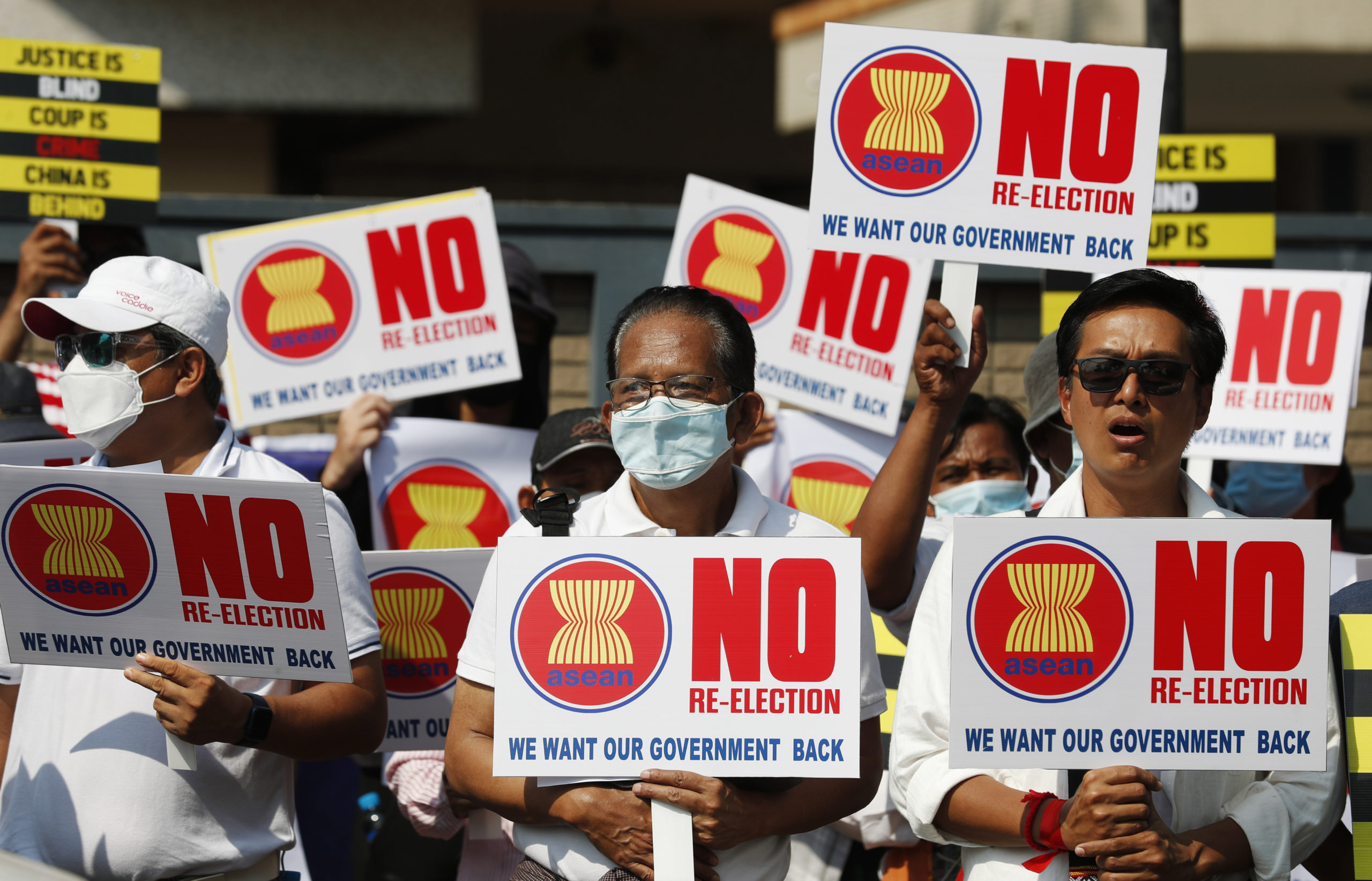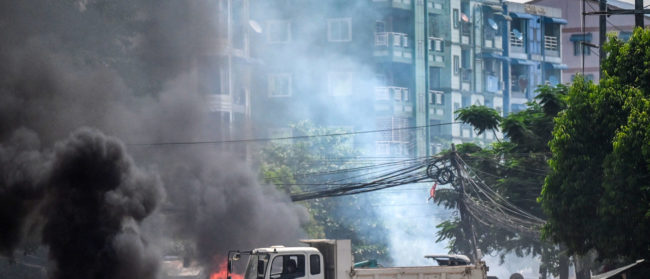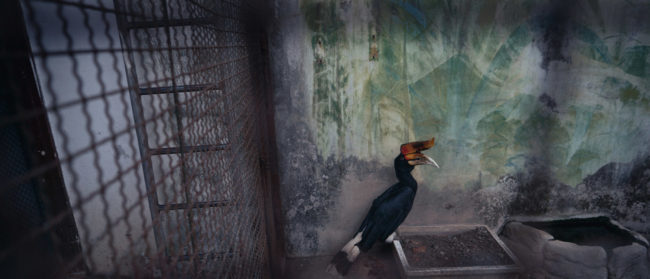With military crackdowns taking hold of streets across Myanmar, and each new day bringing in a higher death toll than the last, a parallel war of words has emerged away from the frontlines.
Facing overwhelming force on the ground from an uncompromising junta, the Committee Representing the Pyidaungsu Hluttaw (CRPH), an interim body representing the toppled elected government, are taking their fight to the world stage in a bid for support from the international community. The military, launching its own efforts to overtake the narrative, has brought in a foreign lobbyist who’s made a career with some of the world’s most controversial regimes.
Outside the fray, some foreign governments are still hoping for national reconciliation, however this outcome looks increasingly unlikely among the CRPH who see the military as an impossible ally.
“There is no point in talking to the killer. How do I negotiate with my killer? If I try to talk to them they will just kill me,” said Dr Sasa, the CRPH’S newly appointed Special Envoy to the UN.
So far, military and police units have killed at least 261 anti-coup protesters across the country. For Sasa and others in the CRPH, the junta’s violent crackdown on dissent is a non-starter for negotiations in rebuilding a democratic state.
Rather than cooperation or compromise, the interim committee is instead looking to international partners to mediate a peace deal through diplomatic channels that would see the outright removal of the current military from Myanmar politics. If that fails, Sasa warns, the committee may be left with armed retaliation as its only option.
“There is no concrete action taking place by the international community, only statements and we don’t need statements anymore. If they fail to intervene – then of course we will do everything we can to protect the people of Myanmar and destroy the Tatmadaw institution completely,” Sasa told the Globe.
“We don’t want this to happen, but the situation is pushing us to this.”
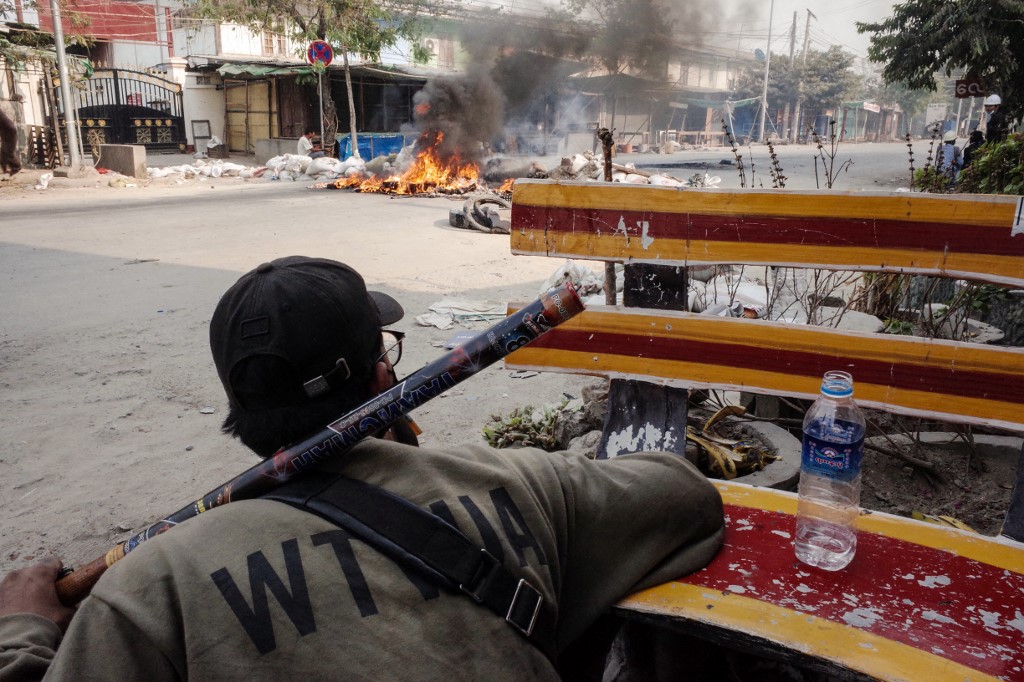
For its part, the military has similarly not shown any willingness to cooperate with the CRPH, detaining elected parliamentarians from the National League for Democracy (NLD), which won a landslide victory in the November 8 national elections. And among those who’ve been killed by the junta, at least two are NLD party members, with family members alleging they’d been tortured to death while in military custody.
Given this risk, many CRPH representatives are currently in hiding within Myanmar or living in exile. Even Sasa, who had escaped to an undisclosed location along the Myanmar-India border shortly before the coup, was issued an arrest warrant last week for treason shortly after speaking with the Globe. In response, Sasa stated on Twitter on March 17 he was “proud to have been charged with treason” as it proves his opposition to the military regime and support for the people of Myanmar.
Even still, the CRPH remains steadfast in their opposition to the military regime but are looking to regional partners in ASEAN to act on their behalf in pushing for the release of all detainees, the abolition of the 2008 constitution, and the removal of the Tatmadaw from Myanmar’s political sphere.
According to Sasa, ASEAN intervening to table these demands is an approach widely supported by those within Myanmar, across the region, and even among international actors like Russia and China, which have previously been opposed to international involvement.
“Releasing all detainees and agreeing on a new constitution that would give power back power to the elected government is what is likeable, approachable,” he said. “ASEAN has to make it very clear that this is the only solution right now that’s available, supported by ASEAN leaders, supported by China and Russia, supported by everyone.”
Yuyun Wahyuningrum, Indonesia’s representative to the ASEAN Intergovernmental Commission on Human Rights (AICHR), has been in close contact with Indonesia’s Ministry of Foreign Affairs as well as various ASEAN ministers. Given the unrelenting violence in Myanmar, she also sees ASEAN as a central mediator in relaying the CRPH’s calls to action to the military.
“What we see now is that both the military and the CRPH have no appetite to enter into dialogue. They are at very extreme sides,” said Wahyuningrum.
“We need to bring them into the middle so they can be ready to speak to each other and that is why the focus of the lobbying is to persuade them to agree on dialogue. But I am worried that this process will take some time, while a number of people are killed and arrested.”
Indonesia is seen as the de facto leader of ASEAN. It’s seen as the biggest, the most populous country, it’s what you would call the largest democracy in Southeast Asia
Along with Singapore, Indonesia has been the most outspoken among ASEAN member states in condemning the violence in Myanmar, with Foreign Minister Retno Marsudi flying to Brunei, ASEAN’s 2021 chair, in February to coalesce a regional front in addressing the mounting instability.
Sharon Li-Lean Seah, the coordinator at the ASEAN Studies Centre at the ISEAS-Yusof Ishak institute in Singapore, specialising in the rule of law within ASEAN, says that it’s unsurprising that Indonesia has taken a leading role on this issue within the bloc.
“Indonesia is seen as the de facto leader of ASEAN. It’s seen as the biggest, the most populous country, it’s what you would call the largest democracy in Southeast Asia and it has always played a really constructive role within ASEAN,” said Seah.
“Foreign Minister Retno has noted, which is important, that what happens in Myanmar impacts the rest of Southeast Asia and the rest of ASEAN. If there is an absence of stability in Myanmar, it could spill over to the rest of us.”
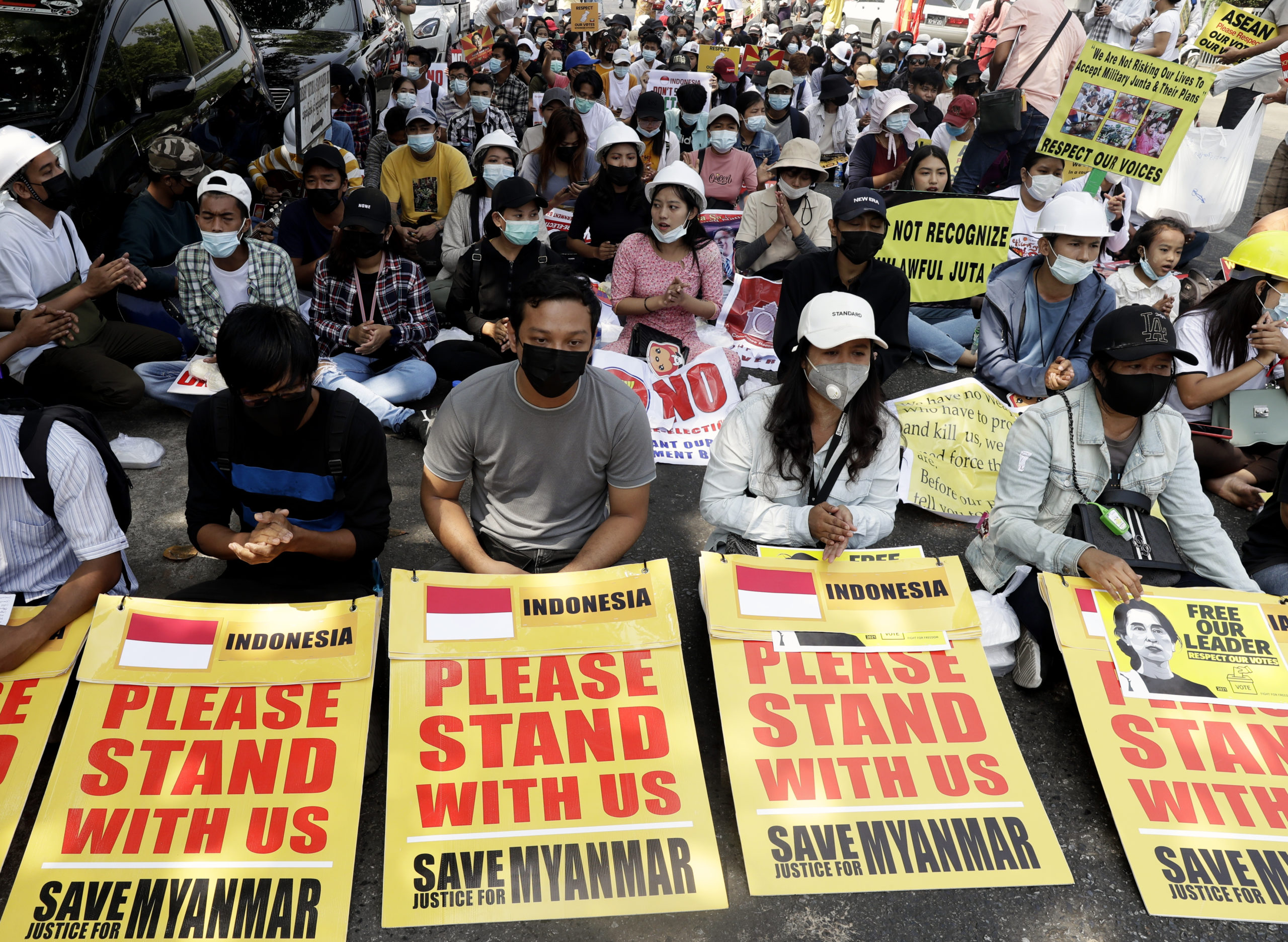
According to Sasa, in conversations with Indonesia and other ASEAN states, the CRPH has been clear that a coalition government with the current military is undesirable to the committee as well as the people of Myanmar, given widespread support for an end to the Tatmadaw’s political authority in the country.
Instead, the CRPH is hoping to bring criminal charges against the institution and its highest-ranking generals for “violent armed aggression directed against the people of Myanmar”, according to a March 11 statement published by the group.
To this end, the CRPH has engaged British law firm Volterra Fietta, led by Robert Volterra and Álvaro Nistal, two seasoned international law experts who have previously represented states across Africa and Europe in human rights cases.
Due to confidentiality reasons, Volterra Fietta declined to comment when asked about the status of the proceedings, but Sasa told the Globe the CRPH has been working with the firm to compile evidence of their allegations against the Tatmadaw.
“We are trying to move quickly but international court cases are a bit slow. However, the military needs to face justice,” Sasa said. “Not bringing these criminals to justice could mean that tomorrow they come back and do the same thing. We will not let this happen again.”
The military, intent on clinging to power, have also flatly rejected the formation of a coalition government, maintaining that the ousted-NLD administration enabled widespread corruption in the November 8 elections and were therefore rightfully forced out.
Advising the military on policy-making decisions and representing their interests on the world stage is Ari Ben-Menashe, a Canadian-Israeli lobbyist from the firm Dickens and Madson who is known for his work with military clients accused of serious rights abuses. Throughout his career, Ben-Menashe has advised Libyan militia commander Khalifa Haftar and Sudanese General Mohamed Hamdan Dagalo – himself a former military leader accused of crimes against humanity in his country’s civil conflict in Darfur.
Having worked with the Burmese military since the 1990s, and now re-employed as part of a $2 million public relations deal with the generals, Ben-Menashe has long been an outspoken defender of the Tatmadaw. With direct lines to the military hard to come by for those outside Myanmar, Ben-Menashe has become central to the Tatmadaw’s international public relations campaign.
In a conversation with the Globe, the lobbyist asserted that Suu Kyi and her toppled NLD government were the true threat to democracy in Myanmar – particularly in their handling of the November 8 elections, which the military maintains were fraught with corruption.
“There was election fraud for real. The election commission was under the NLD, completely controlled by the NLD,” Ben-Menashe said. “They did not allow the minorities to vote. The only votes that took place were in Mandalay and in Yangon. About 10 million votes are missing.”
No evidence has been found to corroborate these claims, and while several polls were closed due to Covid-19 and security concerns in conflict-ridden townships, experts have maintained that this would not have been sufficient to alter the outcome.
Beyond the election results, Ben-Menashe is also pushing claims that minimise the size of the anti-coup demonstrations.
“I don’t think there are millions of people on the street, that’s the whole problem,” he said. “You see a few pockets [of protesters] but honestly I was in downtown Yangon, and sure there was a group there demonstrating, that’s right. But that was it in Yangon, I promise you. This is nonsense – these claims of millions of people, are you kidding me?”
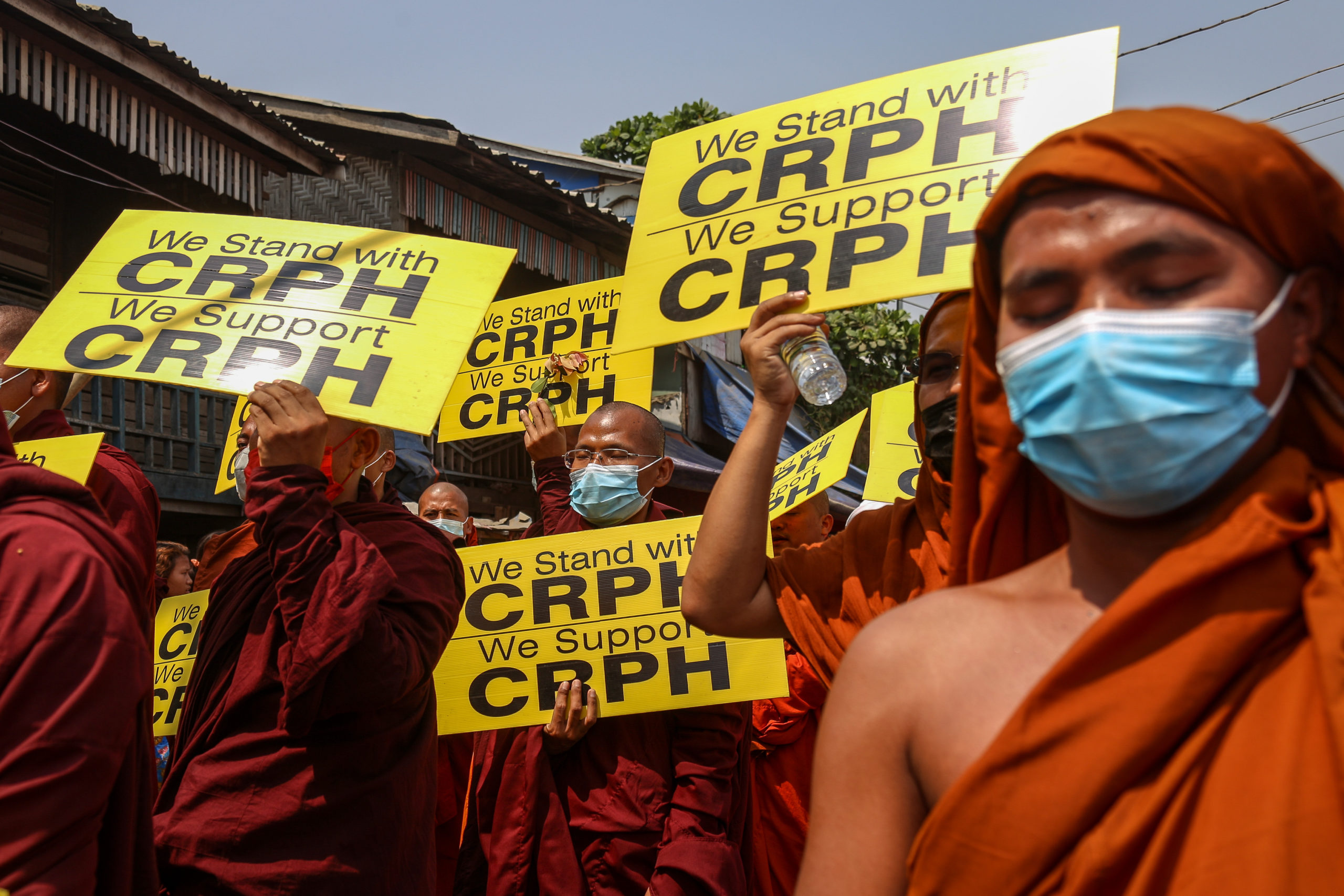
In contrast, images and reports coming out of Myanmar provide direct evidence of widespread opposition to the military regime, with many even citing that these crowds could be bigger than the mass uprisings in 1988 during the previous military rule.
Sasa points to this disinformation emanating from the Tatmadaw as further confirmation that any kind of coalition between the military and CRPH would be futile.
“It is ridiculous, I think the military should be ashamed of themselves for telling lies to the world,” Sasa said. “Our policy is not to talk to people who are supporting the Tatmadaw regime because there is no point. There is no negotiation or talking so long as they support the bloody coup and terrorising the people, and so long as they are helping and advising on it.”
On the military’s side, their claim to power and unwillingness to cooperate with CRPH efforts is reinforced by their steadfast opposition to the now-imprisoned Aung San Suu Kyi, the former state counsellor and NLD party leader.
“Aung San Suu Kyi really was a divider,” said Ben-Menashe. “One of the worst things that could have come out of the NLD rule was that the country was going to break up. She was the worst choice possible, on every level.”
Ben-Menashe specifically highlights Suu Kyi’s speech at the International Court of Justice (ICJ) in 2019, where she was widely condemned for seemingly vindicating the military’s role in the Rohingya genocide. The lobbyist goes one step further, stating that despite the documented attacks by military soldiers against Rohingya, it was Suu Kyi, not the Tatmadaw, who is solely to blame.
“I know everyone says ‘but the military’, but she was head of state. Among the Burmese and Buddhist clergy, it is popular to hate Muslims so she thought that by doing this [going to the Hague] she’d become even more popular,” he concluded.
Suu Kyi’s defence at the ICJ, and her placation of the military, is something that the CRPH is now eager to disavow as they distance themselves as much as possible from any ties Suu Kyi may have had with the Tatmadaw.
“Aung San Suu Kyi’s government was under so much control of the military. The most powerful people in the government came from the armed forces, so if you say something they may kill you or assassinate you,” explained Sa Sa. “In a way, Aung San Suu Kyi was in a very difficult situation. I’m not saying that there were no mistakes, but we need to move on.”
One way in which the CRPH is symbolising this shift is in recognising the Rohingya. While so far only words, this is a step that Suu Kyi refused to take as state counsellor even amidst genocidal violence.
“The Rohingyas are our brothers and sisters. Once we have a federal democratic and free Myanmar, the Rohingya, and everybody, will have the freedom to live in Myanmar,” said Sasa. “No one will be left behind.”
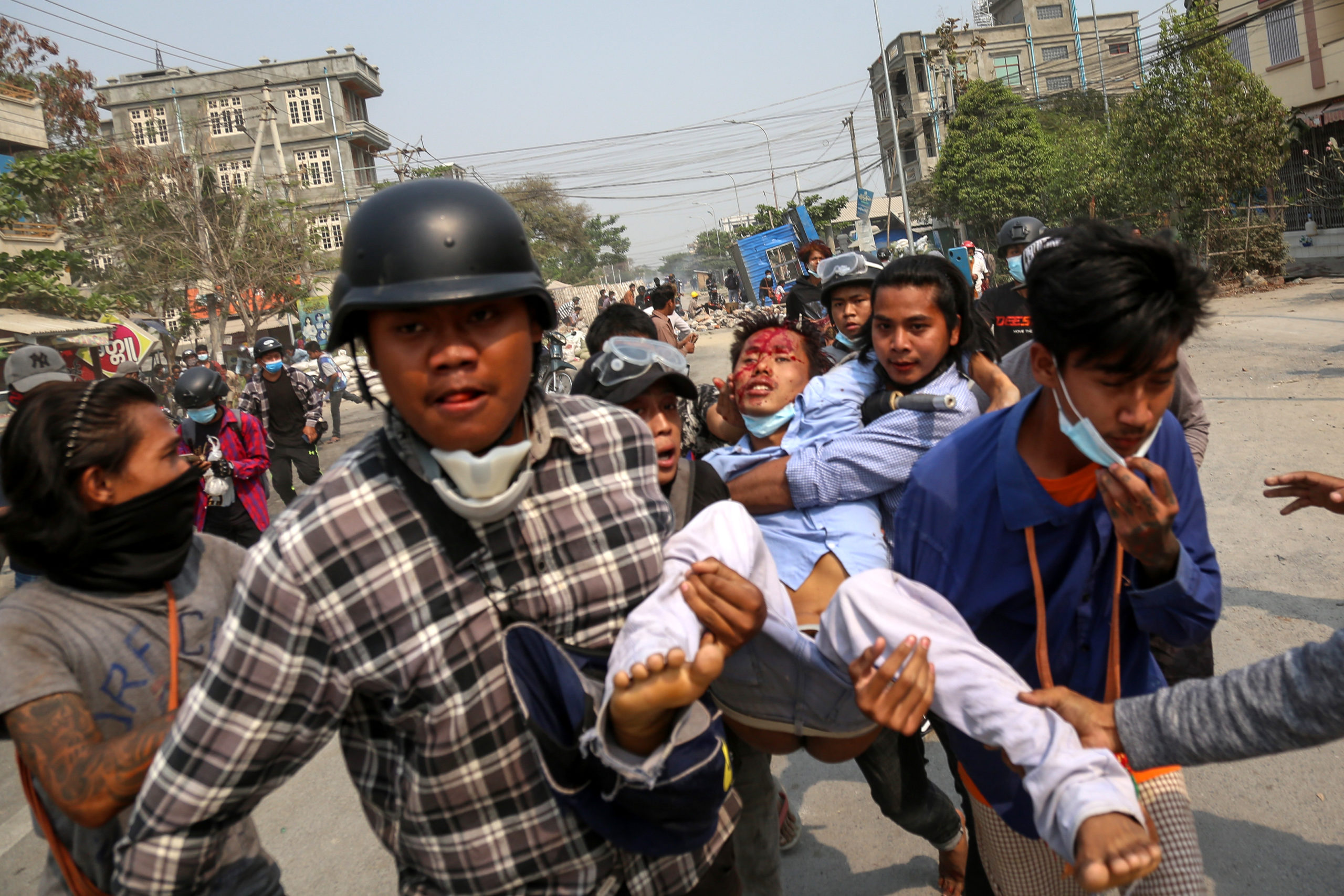
While diplomacy remains a priority, Wahyuningrum told the Globe that unprecedented efforts may need to be adopted, such as suspending Myanmar’s membership to ASEAN – an act that would undermine the permanency promised by the bloc’s founding charter.
Seah recognises that this step would be unusual, but does not think that it is impossible given the history of conflict in Myanmar.
“The ASEAN charter doesn’t provide for suspension or expulsion. In the charter you are permanently part of the ASEAN family. But really it does nothing when it comes to this situation [in Myanmar]. So I think the current set of leaders need to be very creative to resolve this crisis.”
Beyond membership suspension, Wahyuningrum also mentions the possibility of a similarly unprecedented move of member states’ militaries intervening as part of an ASEAN peacekeeping mission.
“There has been a suggestion to use military-to-military lobby such as through Thailand’s military personnel and Indonesian military personnel who both have a long relationship with the military in Myanmar,” said Wahyuningrum. “I can’t say how likely this is to happen, but I do know that there are talks right now between the military in Thailand and the military in Myanmar.”
Given ASEAN’s traditional mandate of non-interference and the reliance of certain member states on diplomacy, Seah stresses that military dialogue, if plausible, would likely be bilateral between member states and not a unified effort on behalf of the bloc.
“There will not be ASEAN-led military intervention in Myanmar, let’s be clear,” she said. “[But] there will hopefully be talks behind the scenes, military-to-military between selected states that are open to getting their military representatives to reach out to Myanmar’s military representatives.”
While this regional backing is preferred, the CRPH is also preparing for the worst case scenario.
We don’t want to go down that road, no one wants to see this happen. How many thousands would die, from both sides, if we go down this road?
According to Sasa, the CRPH has forged alliances with various ethnic groups across the country who are willing to work with the committee in acts of defence if international involvement fails and the military remains unwilling to concede. In a demonstration of solidarity, the CRPH formally announced on March 17 that ethnic armed organisations would no longer be designated as terrorist or unlawful organisations under Myanmar law.
“We have spoken to all the ethnic armed groups and all ethnic political partners. They are ready to defend themselves, defend the nation, and defend the people of Myanmar. But we should not be forcing the people of Myanmar to defend themselves,” explained Sasa.
“We don’t want to go down that road, no one wants to see this happen. How many thousands would die, from both sides, if we go down this road?”
And yet, talk of the formation of a new federal army, including fighters from ethnic armed organisations (EAOs) allied with the CRPH, continues to mount.
To date, several EAO signatories to the country’s Nationwide Ceasefire Agreement – including the Karen National Union, the political wing of the Karen National Liberation Army, the Restoration Council for Shan State, and the Kachin Independence Army – have been in talks of forming an armed alliance.
According to Wahyuningrum, who has been privy to many of ASEAN’s closed-door meetings, the bloc and its member states are aware of the risk of armed resistance and wary that a failure to act could result in intensifying violence.
“The possibility of civil war is something that we are all afraid of. We need to do something now,” she said. “We continue to say that there is no precedent in ASEAN to deal with this, but that is why we need to create the precedent.”
